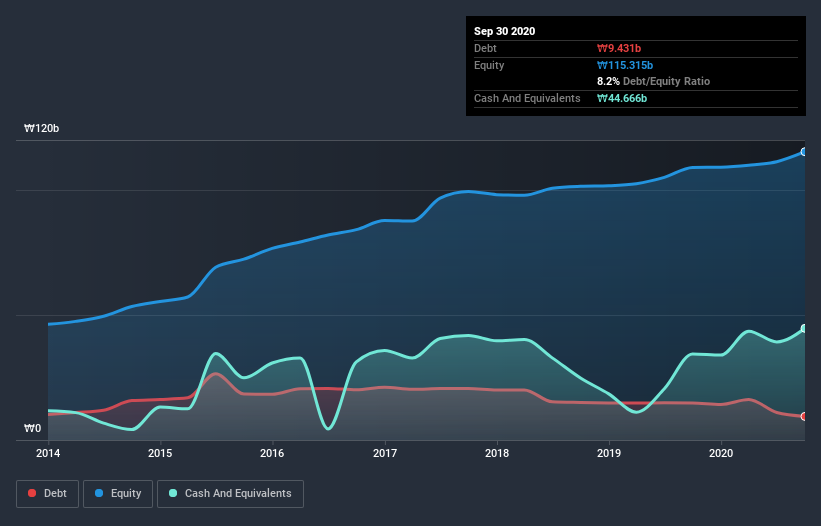Legendary fund manager Li Lu (who Charlie Munger backed) once said, 'The biggest investment risk is not the volatility of prices, but whether you will suffer a permanent loss of capital.' When we think about how risky a company is, we always like to look at its use of debt, since debt overload can lead to ruin. Importantly, Kopla Co., Ltd. (KOSDAQ:126600) does carry debt. But is this debt a concern to shareholders?
Why Does Debt Bring Risk?
Debt is a tool to help businesses grow, but if a business is incapable of paying off its lenders, then it exists at their mercy. In the worst case scenario, a company can go bankrupt if it cannot pay its creditors. However, a more common (but still painful) scenario is that it has to raise new equity capital at a low price, thus permanently diluting shareholders. By replacing dilution, though, debt can be an extremely good tool for businesses that need capital to invest in growth at high rates of return. The first thing to do when considering how much debt a business uses is to look at its cash and debt together.
Check out our latest analysis for Kopla
What Is Kopla's Debt?
The image below, which you can click on for greater detail, shows that Kopla had debt of ₩9.43b at the end of September 2020, a reduction from ₩14.8b over a year. But on the other hand it also has ₩44.7b in cash, leading to a ₩35.2b net cash position.

How Strong Is Kopla's Balance Sheet?
The latest balance sheet data shows that Kopla had liabilities of ₩31.8b due within a year, and liabilities of ₩1.56b falling due after that. Offsetting these obligations, it had cash of ₩44.7b as well as receivables valued at ₩39.1b due within 12 months. So it can boast ₩50.4b more liquid assets than total liabilities.
This surplus strongly suggests that Kopla has a rock-solid balance sheet (and the debt is of no concern whatsoever). Having regard to this fact, we think its balance sheet is just as strong as misogynists are weak. Succinctly put, Kopla boasts net cash, so it's fair to say it does not have a heavy debt load!
Also good is that Kopla grew its EBIT at 19% over the last year, further increasing its ability to manage debt. There's no doubt that we learn most about debt from the balance sheet. But it is future earnings, more than anything, that will determine Kopla's ability to maintain a healthy balance sheet going forward. So if you're focused on the future you can check out this free report showing analyst profit forecasts.
Finally, a company can only pay off debt with cold hard cash, not accounting profits. While Kopla has net cash on its balance sheet, it's still worth taking a look at its ability to convert earnings before interest and tax (EBIT) to free cash flow, to help us understand how quickly it is building (or eroding) that cash balance. During the last three years, Kopla produced sturdy free cash flow equating to 65% of its EBIT, about what we'd expect. This free cash flow puts the company in a good position to pay down debt, when appropriate.
Summing up
While we empathize with investors who find debt concerning, you should keep in mind that Kopla has net cash of ₩35.2b, as well as more liquid assets than liabilities. And we liked the look of last year's 19% year-on-year EBIT growth. When it comes to Kopla's debt, we sufficiently relaxed that our mind turns to the jacuzzi. There's no doubt that we learn most about debt from the balance sheet. But ultimately, every company can contain risks that exist outside of the balance sheet. Like risks, for instance. Every company has them, and we've spotted 3 warning signs for Kopla (of which 1 shouldn't be ignored!) you should know about.
When all is said and done, sometimes its easier to focus on companies that don't even need debt. Readers can access a list of growth stocks with zero net debt 100% free, right now.
When trading Kopla or any other investment, use the platform considered by many to be the Professional's Gateway to the Worlds Market, Interactive Brokers. You get the lowest-cost* trading on stocks, options, futures, forex, bonds and funds worldwide from a single integrated account. Promoted
Valuation is complex, but we're here to simplify it.
Discover if BGFecomaterials might be undervalued or overvalued with our detailed analysis, featuring fair value estimates, potential risks, dividends, insider trades, and its financial condition.
Access Free AnalysisThis article by Simply Wall St is general in nature. It does not constitute a recommendation to buy or sell any stock, and does not take account of your objectives, or your financial situation. We aim to bring you long-term focused analysis driven by fundamental data. Note that our analysis may not factor in the latest price-sensitive company announcements or qualitative material. Simply Wall St has no position in any stocks mentioned.
*Interactive Brokers Rated Lowest Cost Broker by StockBrokers.com Annual Online Review 2020
Have feedback on this article? Concerned about the content? Get in touch with us directly. Alternatively, email editorial-team@simplywallst.com.
About KOSDAQ:A126600
BGFecomaterials
Manufactures and sells engineering plastic resins in South Korea and internationally.
Adequate balance sheet unattractive dividend payer.
Market Insights
Community Narratives




